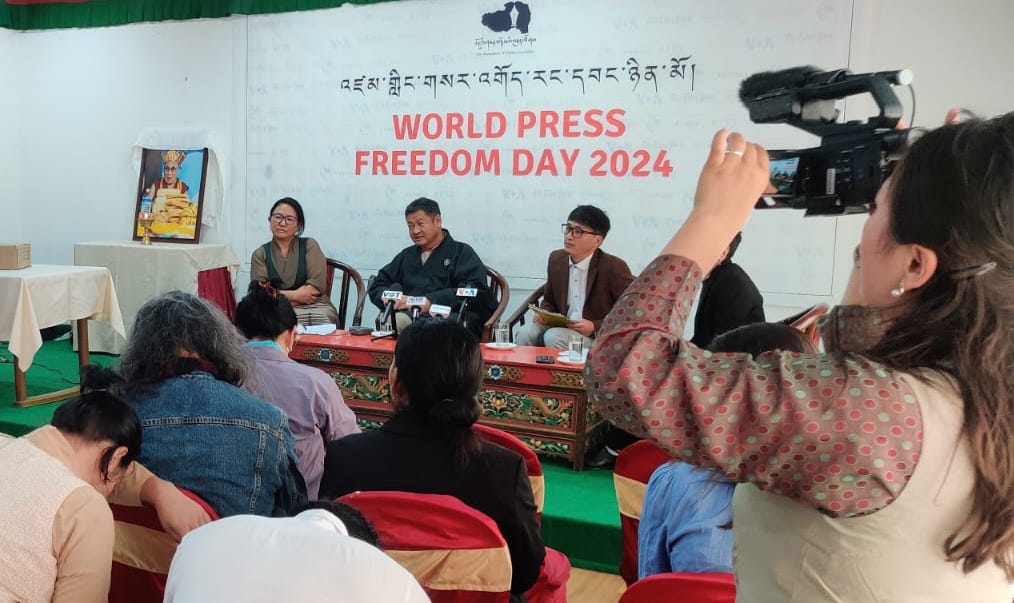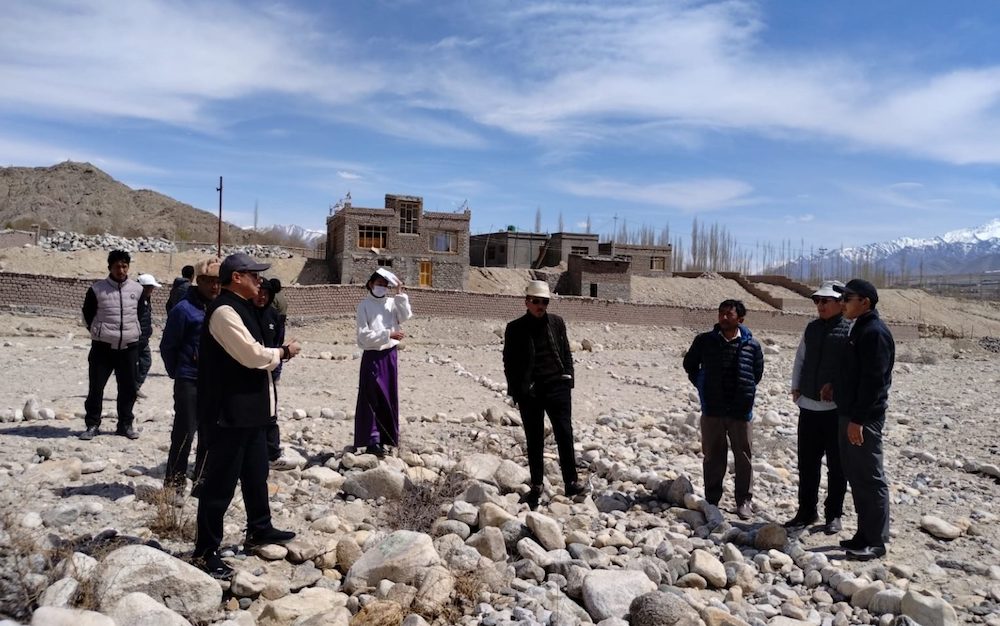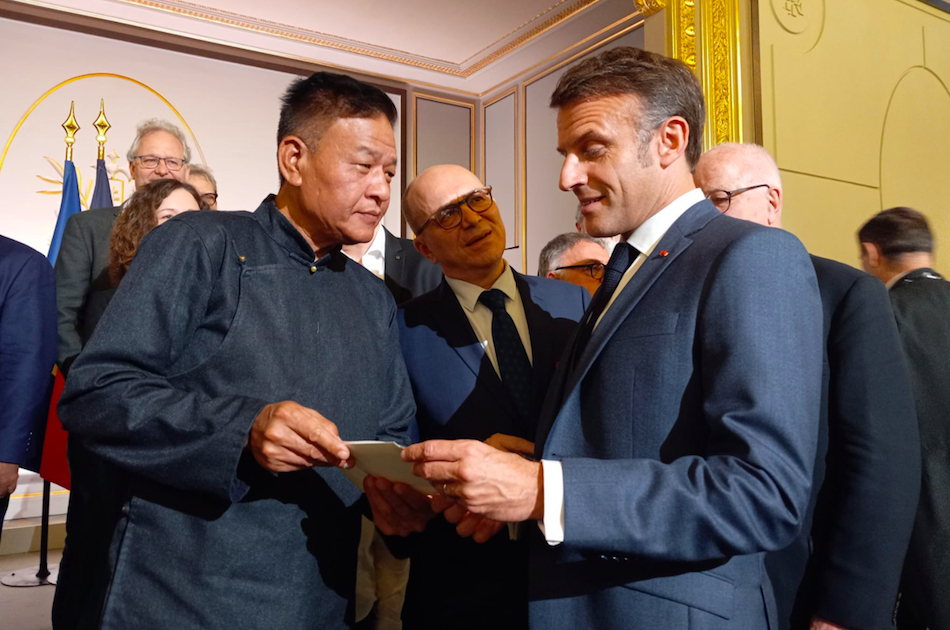In New York or in New Delhi, the Dalai Lama speaks little, says much
By JYOTI MALHOTRA
There’s more than an ocean that separates New York from New Delhi and some of it shows up in the crowds that come to hear the Dalai Lama. Barely a fortnight ago, a lecture in Central Park by Tibetan Buddhism’s holiest leader was swarming with human bodies sitting cheek by jowl, some 65,000 of them, hoping that some of the trauma of 9/11 would disappear simply by being in Tenzing Gyatso’s beatific presence.
On the morning of Monday, October 7, at the Buddha Jayanti Park on New Delhi’s edge, the crowd was so intimate it might be impolite to call it ‘‘small’’. The majority of the 3,000-odd people were Tibetans, waiting in queue for a darshan of their guru. Or there were foreigners, among them a sprinkling of the city’s diplomatic corps, shoeless on the cotton carpet beneath. You could count the Indians on one hand — although, by one account, there were not a few Ladakhis in the respectable melee.
Perhaps it was the lack of publicity by Tibet House. Maybe, too, the Dalai Lama had happened upon the city on a Monday morning, while his New York lecture in Central Park had taken place on a balmy Sunday afternoon, allowing parents to bring both beach balls and children with them.
You could also say New Delhi had grown so used to the Dalai Lama. After all, he has been living in India since 1959.
Former foreign secretary M.K. Rasgotra, who as a young IFS officer received the Dalai Lama when he escaped Chinese repression in Tibet and was subsequently responsible for settling the 100,000-odd Tibetan refugees in India, put it succinctly. ‘‘The Dalai Lama’s place in India as a religious person remains very high,’’ Rasgotra said, ‘‘unfortunately, Delhi is a very cynical sort of place.’’
Rasgotra pointed out that the discourse, a teaching on Nagarjuna, the Bodhisattva of Compassion, as part of a morning-long festival of spiritual chants from all over the world, was really ‘‘aimed at the devout’’. Perhaps, he added kindly, other people had heard him on different occasions in the city.
But back in New York on September 21, it would have been a wonder if you hadn’t heard the Dalai Lama Was Coming! It was all over the airwaves and in print. The crowds had begun to gather some four hours before his noon address at the Park’s East Meadow — and they kept coming. Black and White and Hispanic, young and old, New Yorkers and outsiders.
All of them were joined by a single mantra: after 9/11, give us the strength to hold on to something of lasting value.
Marianne, a software engineer, explained to this reporter that ‘‘there was so much anger’’ after the events of September 11, 2001, that a lot of Americans just wanted some meaning in their lives. ‘‘He laughs so much all the time, just like a small boy, and then he tells you that its important to be selfless and forgiving at the same time. Considering what the Tibetans are still going through, he’s a living example,’’ she said.
Judith, a jewellery designer, conceded Richard Gere’s presence at Central Park may have contributed to the crowd. ‘‘Buddhism may still be a bit of a fad in the US, with people saying, ‘Oh, I’ve tried vegetarianism, transcendental meditation, now let me check out the Dalai Lama,’ ’’ she said, ‘‘but today’s numbers also point to an increasing need to go beyond the single book that Christianity offers.’’
Considering the enormous crowd was single-mindedly focused on the large television screens for a good hour, the Dalai Lama’s address seemed like good value. ‘‘I have nothing to offer,’’ he said in regular self-deprecation, ‘‘Just some blah, blah, blah!’’ Then he laughed. An appreciative ripple ran through the crowd.
He spoke of compassion and non-violence and the fact that war was out of date. And then to an audience that has consistently insisted that President George W. Bush ‘‘stole the 2001 election’’ and had no moral authority to attack Iraq, the Dalai Lama added, ‘‘Destruction of your neighbour as an enemy is essentially a destruction of yourself.’’
But analysts also pointed out that the Tibetan leader had come to Central Park almost at the end of a very successful three-week tour of the US, a highlight of which had been a meeting with Bush. In full view of the cameras, both leaders had shaken hands. Subsequently, the US leadership had endorsed the Dalai Lama’s renewed attempts to start a dialogue with Beijing by sending two teams of representatives in the past nine months.
Monday morning in Delhi was so different, the Tibetan leader allowing nothing else to come in the way of a discourse on being and nothingness. The nature of all phenomena is suffering. One man’s way of seeing is different from another’s. Everything in this world is interdependent. When you achieve true cessation, you achieve a state of nirvana, which is the transcendence of all suffering.
Even his long journey that began in Spain today, continuing into France, Germany and the Czech republic, Tibetan officials said, would be of a completely religious nature.
Rasgotra seemed overwhelmed. ‘‘The Dalai Lama has done more for the spread of Buddhism than almost anybody since Lord Buddha himself. He’s an amazing man. Even his laughter seems cosmic,’’ he added.









